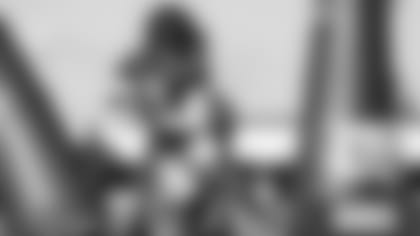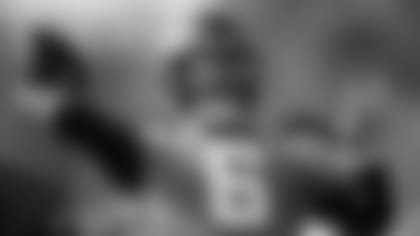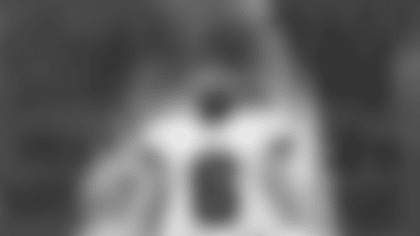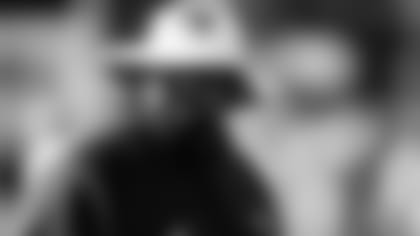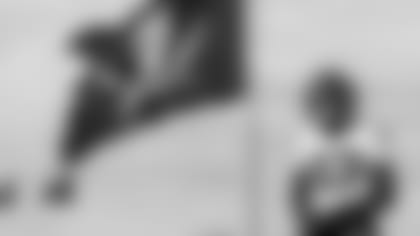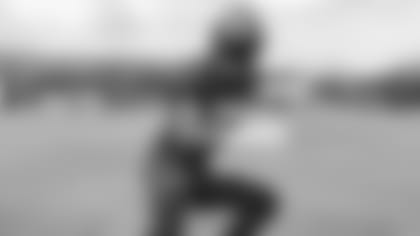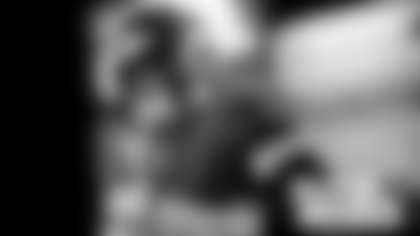Tristan Wirfs was the very definition of an instant success story in the NFL. Drafted 13th overall by the Tampa Bay Buccaneers in 2020, he stepped directly into the right tackle job, played every snap across 20 games, earned Associated Press All-Pro votes as a rookie, allowed one sack all season and walked away with a Super Bowl championship ring.
Wirfs has only ascended from there, earning two Pro Bowl invitations and one first-team All-Pro nod over the next two seasons. He's 24 years old already widely considered one of the very best offensive linemen in the league. Considering all of that, and his very sunny demeanor, it's difficult to imagine, in retrospect, that Wirfs ever experienced a crack in his confidence over those three years.
The only reason we know that he did, in fact, have such doubts is because he decided to tell us.
On Friday, after the Buccaneers' eighth practice of training camp, Wirfs sat down to give another update on how his switch from right to left tackle is going, which is admittedly one of the most important storylines for the team in 2023. For the first time he revealed that perhaps the most challenging part of the process was harnessing his own mind.
"I was in a really rough spot mentally," said Wirfs of his offseason, after the Bucs had made it clear they were planning to move him to the other side of the line after the release of long-time left tackle Donovan Smith. "I was really nervous. I was playing out the season in my head over and over again like, 'Oh, what if it goes this way or what if it goes this way?' So, I was like, 'It is freaking May. You have to calm down.' It has been a lot better by just trusting myself and having confidence in my abilities. Knowing the work that I have put in will pay off. I have been coming out here every day with the best attitude that I can."
At first reticent to share his darker thoughts with anyone, Wirfs eventually and wisely sought out help, choosing to sit down for multiple sessions with sports psychologist Dr. Joe Carella
"I was very reserved in talking about how I was feeling," said Wirfs. "I am still trying to get better at it. It seems so miniscule like, 'Oh, you are just flipping sides.' But I was having breakdowns about it. I decided I cannot sit here with these thoughts anymore. I was setting myself up for failure. I would just think about, 'I am going to suck.' Or like, 'I am not going to be able to do it,' for all day long.
"So being able to talk to Dr. Joe and just get those thoughts out of your head [helps]. Just being able to say them helps tremendously, just getting them out of your own head. I am still trying to get better at saying what I am thinking and feeling. I feel like in this sport you have to be tough and all that stuff, so just being able to get things off your chest and let somebody in that is there to help. They know what they are doing. He is a professional at what he does, and I am a professional at what I do. So, I let him or her do their job. It has been very beneficial getting that stuff out of my head."
Wirfs is in a better place now, and by all accounts his switch to the critical left tackle position is going seamlessly. He said the 'negative self-talk,' hasn't necessarily disappeared completely, but he's been able to crowd them out with more positive thoughts. Instead of picturing himself throwing his hands the wrong way or setting up like he's still on the right side, he envisions good results. He says he's trying to turn the negatives into positives."
Having doubts when faced with a new and big challenge is, of course, an extremely human thing to do, and as big and as athletic as Wirfs and his colleagues are, they are not superhuman. Wirfs credits Philadelphia Eagles star tackle Lane Johnson for being at the forefront of speaking about athletes and mental health, and for being supportive of those who need it. It's clear that Wirfs has learned a lot about himself and how to deal with his own self-doubts. Because his current position switch isn't the first thing that has caused him to wonder if he was up to the challenge.
"I thought about that all the time," said Wirfs, rewinding to when he was first getting acclimated to the NFL. "I was like, 'OK, well if I do not do this, then I am this. If I don't do this, then I am a failure. If I don't do this, then I suck. If I don't do this, then I am not a good football player.' All that stuff. I think having those things happen in the first three years are huge to what I am thinking about. Being a first-rounder, coming out [of college], when I first got here to camp I talked about it too. I went up against Shaquil [Barrett] and 'JPP' (Jason Pierre-Paul), I was like, 'I can't do this. I am terrible.' I would go back to my apartment and just think like, 'Oh my goodness, I am not cut out for this.' Now it is just trying to keep those thoughts out as much as I can."
Wirfs has used other tricks to get his mind adjusted to playing on the left side of the line instead of the right. For instance, he likes to hold a wet sponge in his right hand during drills to remind him to shoot that hand first. Eventually, muscle memory will take over and it will become as natural as playing on the right side to him. He points out that players vying for a swing-tackle reserve role have to learn and be ready to play both positions at the same time. That tells him it's possible.
And, of course, it's more than just possible for Wirfs. Given the outsized success he's already experienced and his sublime physical gifts, it's nearly a guarantee. That's easy for an outside observer like your author to say, because it's demonstrably true and, most notably, in the end it's somebody else who has to make it work. For Wirfs, the first person he had to convince was himself.






